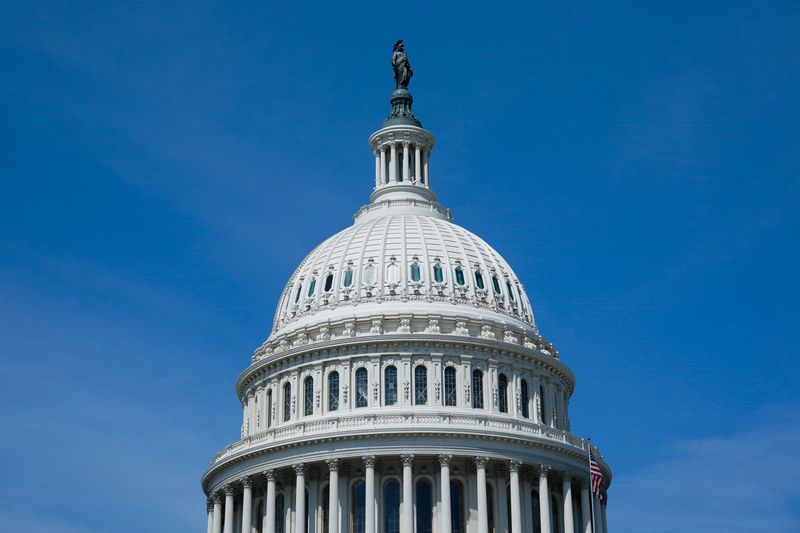By James Oliphant and Jason Lange
WASHINGTON (Reuters) - Control of the U.S. Congress is at stake in November's midterm elections, along with President Joe Biden’s remaining policy agenda.
Republicans stand a strong chance of taking control of the U.S. House of Representatives, while Democrats have more hope of retaining a majority in the Senate. A Republican House would be enough to derail most legislation Biden and his fellow Democrats want to enact, as well as likely spurring a wave of new congressional probes of the administration.
HISTORICAL HEADWINDS
The party in power typically loses House seats during the first four-year term of a new president.
Democratic President Barack Obama's party lost a devastating 63 seats in the 2010 election during his first term. In 2018, two years into Donald Trump’s presidency, the Republican Party gave up 41 House seats. In both cases, control of the chamber flipped.
This year, Republicans need only to gain four seats in the Nov. 8 elections to assume the majority in the 435-member chamber.
Their prospects of winning those seats have been enhanced through gerrymandering, the practice by which one party manipulates congressional district lines to entrench its own power during the once-a-decade redistricting process.
Republicans have muscled advantageous new maps through statehouses they control, including in Texas and Florida, while Democrats in New York saw their own aggressive map invalidated by the state's high court.
Fewer than 35 House races are viewed by election analysts as true toss-ups in November, according to an aggregate of leading election analysts.
SOME DEMOCRATS HEAD FOR THE DOOR
House Democrats fearing a Republican takeover have sprinted for the exits. Thirty-one House Democrats have announced they are retiring or seeking other office, the most for the party since 1992.
Republicans need to gain only one seat to take control of the U.S. Senate, which is currently divided 50-50 with Vice President Kamala Harris as the tie-breaking vote.
But battle-tested Democratic incumbents in Arizona, Georgia and Nevada may help the party hold onto those seats, while Republicans could surrender seats in Pennsylvania and Wisconsin, two states that voted for Biden over Trump in the 2020 election.
On the other hand, a Republican wave could result in all those seats going that party’s way, along perhaps with Colorado and New Hampshire.
BIDEN UNDERWATER
While Biden is not on the November ballot, midterms frequently serve as a referendum on the president. Biden's popularity rebounded slightly over the summer after a series of policy victories and some improved economic news, but he still remains underwater with the American public.
Less than half of the country – 38% - approves of his performance, according to a Reuters/Ipsos poll conducted Aug. 29-30. That same poll showed that 69% of Americans believe the country is on the wrong track, compared with just 21% who said it was on the right track.
Trump also is not on the ballot. But he has successfully backed a slate of like-minded candidates as he attempts to remain the de facto leader of his party ahead of another possible White House bid in 2024.
Democrats have been buoyed by the fallout from the U.S. Supreme Court's decision overturning the constitutional abortion protections of Roe v. Wade, which has resulted in a surge of Democratic protest votes in a Kansas referendum and a series of House special elections. Unrest over the court decision seems to have erased Republicans' edge in voter enthusiasm.
"Democrats have more reasons to be optimistic than they have had in a long time," said Jacob Rubashkin, an analyst with Inside Elections in Washington. "But Democrats' position is still incredibly dire in both chambers."
Democrats also hope that Trump's legal problems stemming from the recent FBI raid of his Florida home and continuing probes into his role in the push to overturn the 2020 election will make swing voters less inclined to support Republican candidates.
ECONOMIC ANXIETY
Democrats' expectations that a swift economic recovery from the COVID-19 pandemic would boost their midterm prospects have not been realized.
Despite a sharp drop in unemployment, the economy remains plagued by rampant inflation, which spiked the cost of household staples such as food and energy. Even as the prices of some goods such as gasoline have come down, the Federal Reserve recently warned that it will still need to take aggressive steps to control inflation that could slow growth.
Polls by Reuters/Ipsos and others continue to show the economy as the top concern of voters, far outpacing other issues such as crime, immigration, abortion and the environment.

Democrats have argued that a recent climate and healthcare package passed by Congress will help tamp down inflation by, among other things, making prescription drugs more affordable and cutting healthcare costs.
The Biden White House also recently announced the government would forgive some student-loan debt, a controversial decision that Democrats hope helps spur turnout among younger voters.